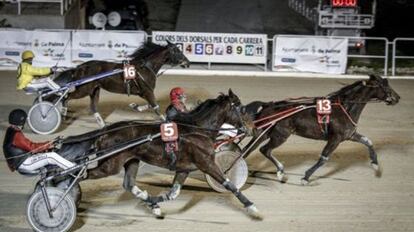Why killing an animal could now mean serving prison time in Spain
Mallorca man becomes first Spaniard to enter jail for abuse as sentences toughen

A 41-year-old beverage distributor who was convicted of beating his racehorse to death became the first person in Spain to go to jail on animal cruelty charges as the law toughens up punishments, sources in the Attorney General’s Office revealed last week.
In a country that has a long history of animal abuse, many rights groups in Spain have applauded the sentence and the higher penalties included in the penal code over the summer.
In a country with a long history of animal abuse, rights groups in Spain have applauded the sentence
Eugenio Sánchez María, who co-owned the racehorse Sorky das Pont, was handed an eight-month jail sentence by a Mallorca judge after he was found guilty of beating the animal with a piece of wood and breaking his neck after the horse was disqualified from a harness race held in Manacor in 2012.
In his ruling, Judge Eduardo Calderón said that Sánchez struck various blows to the horse’s head that resulted in its death. The defendant had initially said his horse broke his neck when it hit its head on the ceiling of its stall after trying to get up.
During his trial in April, the defendant appeared aloof and unaware of what was going on, according to witnesses. He barely spoke, accepting the facts of the case and the subsequent eight-month sentence.
Sorky’s sad end

Sorky das Pont, who was born in Menorca, was a cross between a US sire and a dam from Sweden, and had won about 20 percent of the 100 races in which he had participated.
On the night of his death, Sorky was disqualified from the race after he lost his pace and broke into a gallop. This infuriated Sánchez. The total prize money for the race was €500.
In the Balearic Islands, where trotting is a traditional sport, there are an estimated 500 trotting horse owners and riders. Of the 7,000 registered horses, which are trained to trot instead of gallop, about 1,000 compete in races.
Sorky’s co-owner, Pedro José Tous, has renounced all claims to possible compensation for the dead horse.
But neither he nor his lawyers thought he would end up serving prison time.
“He is a good man, but he has lost about 30 to 40 kilos ever since this occurred,” said one horse-owner at the Manacor racetrack. “He is completely devastated, and we are concerned about him.”
Some years back, Sánchez was ordered to perform community service after he was convicted of driving under the influence. “His prior criminal record has been off the books for a long time,” his defense lawyer said.
They appealed the sentence for the horse’s death and the rejection of the request for it to be replaced by community service to the Palma de Mallorca regional High Court. But a judge reaffirmed the lower court’s order.
“This is an extraordinary measure,” said one person close to Sánchez’s defense team. “If a motorist hits a cyclist and causes his death they can be sentenced to one year and won’t have to serve any jail time.”
Palma High Court Judge María Jesús Campos Barciela, who ordered Sánchez to report to prison two weeks ago, is known for her expressive and almost philosophical written rulings. She takes the rights of victims and mistreatment of animals very seriously. Until now, she has not been a high-profile judge, and she does not seek publicity.
Several weeks before, she sentenced another man to prison for one year after he was convicted of letting his dog starve to death.
“Leaving a person or an animal to die from hunger is one of the cruelest things,” she wrote in her ruling. “He induced a slow and atrocious agony on the dog that lasted for months.”
As with Sánchez, she also rejected the defendant’s request for community service. The convicted animal abuser, who has not yet reported to prison, is expected to appeal the case.
Manuel José Molina, a lawyer who brought the charge against Sánchez on behalf of the Balearic Lawyers’ Association for Animal Defense, said they had asked that he be remanded.
“This crime carries a one-year sentence,” he said. “This is no surprise to us.”
Advocacy lawyers have explained that there is now much more public awareness about mistreating animals.
In its annual report in 2013, the region’s coordinating prosecutor for environmental and urban development warned about the increasing number of complaints by the public. “We can see in general terms how society has become more sensitive about this scourge.”
There has also been a rise in the number of convictions since 2008 for these types of crimes. That same year, the coordinating prosecutor’s office reported 11 convictions; last year, 62 people were found guilty of animal cruelty.
If the crime involves the death of an animal, the defendant can be sentenced to up to 18 months
As part of the penal code reforms, the Popular Party (PP) government last July approved stronger penalties for those violating animal protection laws, said Sabina Sánchez, who is a lawyer for pro-animal rights party PACMA.
The maximum penalty is one year in prison. However, if it involves the death of an animal, the defendant can be sentenced to up to 18 months.
“We still haven’t reached two-year sentences,” she says.
Under Spanish law, a judge at his discretion can suspend jail time if a person is sentenced to two years or less and does not have a prior criminal record. In most cases, those found guilty are ordered to perform community service.
Antonio Vercher, the coordinating prosecutor for environment and urban affairs, has welcomed the changes to the law because most of these crimes, as he puts it, are “atrocities.”
Sánchez will be banned from performing any type of job or activity related to animals for three years
In the racehorse owner’s case, Vercher says the judge expressed “in a clear” and “precise” manner why she opted for jail time over community service.
“This is a landmark case,” adds the PACMA lawyer.
After he serves his time, Sánchez will be banned from performing any type of job or activity related to animals for three years.
He has also been suspended from the Balearic Trotting Federation as a preventive measure. According to federation president Joan Llabata, the group investigated the case “until the Civil Guard assumed jurisdiction.”
“We haven’t seen him at the racetrack since New Year’s Eve 2012, the day of the incident.”
English version by Martin Delfín.
Tu suscripción se está usando en otro dispositivo
¿Quieres añadir otro usuario a tu suscripción?
Si continúas leyendo en este dispositivo, no se podrá leer en el otro.
FlechaTu suscripción se está usando en otro dispositivo y solo puedes acceder a EL PAÍS desde un dispositivo a la vez.
Si quieres compartir tu cuenta, cambia tu suscripción a la modalidad Premium, así podrás añadir otro usuario. Cada uno accederá con su propia cuenta de email, lo que os permitirá personalizar vuestra experiencia en EL PAÍS.
¿Tienes una suscripción de empresa? Accede aquí para contratar más cuentas.
En el caso de no saber quién está usando tu cuenta, te recomendamos cambiar tu contraseña aquí.
Si decides continuar compartiendo tu cuenta, este mensaje se mostrará en tu dispositivo y en el de la otra persona que está usando tu cuenta de forma indefinida, afectando a tu experiencia de lectura. Puedes consultar aquí los términos y condiciones de la suscripción digital.








































